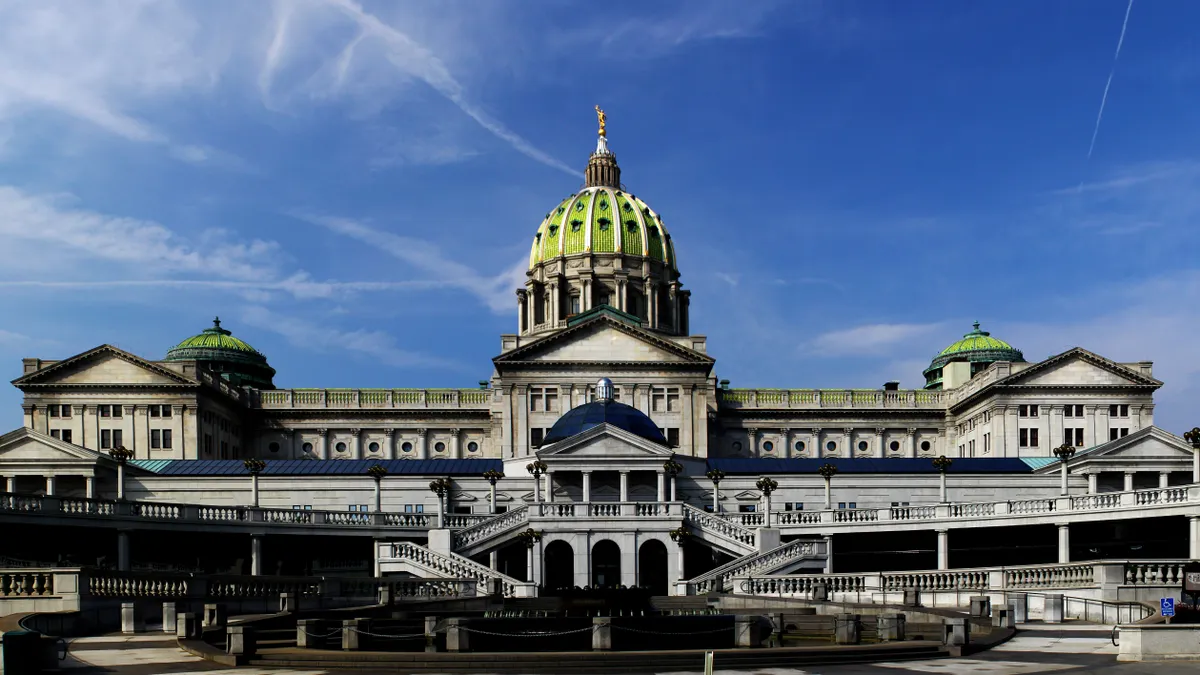Dive Brief:
- The Pennsylvania Environmental Quality Board (EQB) on Tuesday voted 13-6 to launch a formal rulemaking process required for the state to join the Regional Greenhouse Gas Initiative (RGGI), a carbon cap and trade program among 10 Northeast and Mid-Atlantic states.
- According to analysis by the state's Department of Environmental Protection (DEP), joining RGGI would reduce carbon emissions by an estimated 188 million tons between 2022 and 2030, produce a net increase of more than 30,000 jobs and boost Pennsylvania's gross state product by $1.9 billion. Opponents of the measure, however, say it will dissuade businesses from investing in the state and result in a loss of jobs.
- Pennsylvania Gov. Tom Wolf, D, in October committed the state to joining RGGI and since then, the issue has become contentious. Lawmakers have passed legislation restricting the state from joining the carbon market without legislative approval but the governor has said he will veto the bill.
Dive Insight:
The EQB vote on Tuesday was only an initial step, but observers say it is also a good indication of how the process may look going forward: increasingly political, and with angry debate at every step.
Republicans on the board made motions for yesterday's vote to be delayed — and as EQB members began voting against those motions, an unknown participant in the virtual meeting could be heard saying "F--- you." And it was not the only profanity unleashed in the meeting.
"Pennsylvania is historically a big fossil fuel state," said Rob Altenburg, director of PennFuture Energy Center. "We don't have a lot of coal left, but we have a lot of natural gas. And the coal and gas industry oppose any sort of price on carbon."
Opposition driven by fossil fuel interests has also materialized in the state's legislature. Both the House and Senate passed HB 2025, which states the DEP "does not have authority to join" RGGI or other state or regional greenhouse gas cap-and-trade programs "unless authorized by the General Assembly."
However, Gov. Wolf has indicated he will veto the bill, and it was not passed by a veto-proof majority.
"I absolutely foresee that as long as the General Assembly remains in Republican control, there will be legislative attempts to undo the rulemaking," said Mark Szybist, senior attorney in the Natural Resources Defense Council's Climate and Clean Energy Program.
Despite that, Szybist said the rulemaking is likely to ultimately be approved—though the process ahead is complicated.
The proposed regulation will now be reviewed by the Pennsylvania Office of the Attorney General and a public comment and participation period will be announced at a later date. Following the comment period, DEP may modify the proposal and then the EQB will vote on the "final-form regulation."
The plan advanced by Wolf calls for Pennsylvania to begin participating in the first RGGI quarterly auction in 2022.
"It's hard to foresee a situation where the EQB would not advance a final-form rulemaking," said Szybist. But that is not the end of the process — the rule would then need to be approved by the state's Independent Regulatory Review Commission and the General Assembly will have a chance to "disapprove" it.
But to kill the rule, the legislature would have to pass a resolution and send it to the governor. "We don't have a legislative veto" in Pennsylvania, said Altenburg.
Under the proposed regulation, electric generators that emit carbon dioxide would be required to obtain credits compatible with other states participating in RGGI. Opponents attacked both the idea of Pennsylvania joining the regional market and the virtual process.
The Pennsylvania House Environmental Resources and Energy Committee Majority Chairman Daryl Metcalfe, R, called the vote "disgraceful" and said the EQB should not have held the meeting and vote virtually.
"This is an issue that will fundamentally transform the energy market in the Commonwealth," Metcalfe said during the meeting. "This is a flawed process to consider such a scheme as RGGI. ... It is simply not possible to have the same level of debate" as at an in-person meeting.
Metcalfe said the meeting, held virtually due to COVID-19, showed a "complete lack of transparency" and "supports the conclusion the DEP is committed to sneaking through this regulation."
He also argued that placing a price on carbon amounted to a new tax, and that joining RGGI without legislative approval "violates Pennsylvania's law and constitution."
DEP Secretary Patrick McDonnell, in a statement, noted that electricity generation is one of the leading sources of carbon dioxide emissions in Pennsylvania — and the state is a leading emissions source in the country.
Tuesday's vote was "an important step for Pennsylvania's efforts to combat climate change, which is already having and will continue to have a dramatic effect on Pennsylvania," McDonnell said. "This is incredibly important and we are looking forward to hearing from the people of Pennsylvania about this effort."
Current RGGI members are: Connecticut, Delaware, Maine, Maryland, Massachusetts, New Hampshire, New Jersey, New York, Rhode Island and Vermont.















